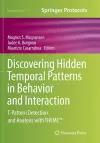
Discovering Hidden Temporal Patterns in Behavior and Interaction
3 contributors - Paperback
£80.99 was £89.99
Magnus S. Magnusson, PhD
Magnus S. Magnusson is the creator of the T-pattern model and analysis and the author of the THEMETM Behavior Research software. He currently serves as a Research Professor at the University of Iceland, and is the founder and director of its Human Behavior Laboratory. He has worked as an invited professor at the Psychological Laboratory of University René Descartes Paris V in the Sorbonne, where in 1995 a formal inter-university collaboration convention was initiated with the T-Pattern model and analysis as the common reference. It has now been signed by 24 universities in Europe, the U.S. and Mexico. Dr. Magnusson has authored and coauthored numerous papers and chapters in many areas of behavioral and neuroscience including research on humans, animals and neuronal networks in living brains. In 2015 the Journal of Neuroscience Methods published a comprehensive review of his T-Pattern Analysis (TPA) for the analysis of the real-time structure of behavior and interaction, and a paper presenting results of TPA of interactions in neuronal networks in the olfactory bulb. He has given many invited talks at conferences and universities across the world.
___
Judee K. Burgoon, PhD
Judee Burgoon is Professor of Communication, Family Studies and Human Development at the University of Arizona, where she is Director of Research for the Center for the Management of Information and Site Director for the Center for Identification Technology Research, a National Science Foundation Industry/University Cooperative Research Center. Previously she held faculty appointments at the University of Florida, Michigan State University, and University of Oklahoma and was a Visiting Scholar at Harvard University. She has authored or edited 13 books and monographs and over 300 articles, chapters and reviews related to interpersonal, group, nonverbal and verbal communication. Her recent work has emphasized deception, computer-mediated communication and human-computer interaction. Her research has been funded by the National Science Foundation, Department of Defense, Department of Homeland Security, and IARPA, among others. Her awards and honors include, from the International Communication Association, the Steven Chaffee Career Productivity Award, Robert Kibler Mentorship Award, and election as Fellow; from the National Communication Association, the Distinguished Scholar Award for a lifetime of scholarly achievement, the Mark L. Knapp Award in Interpersonal Communication and the Charles Woolbert Research Award for Scholarship of Lasting Impact. A recent survey identified her as the most prolific female scholar in communication in the 20th century.
___
Maurizio Casarrubea, PhD
Maurizio Casarrubea has, since 2005, served as a Research Associate at the University of Palermo - Italy, Institute of Human Physiology “Giuseppe Pagano”, Laboratory of Behavioral Physiology, Department of Experimental Biomedicine and Clinical Neurosciences. He graduated from the University of Palermo with degrees in Medicine and Surgery, and a medical specialization in Sport Medicine and a PhD in Neurosensorial Physiophatology. Dr. Casarrubea currently teaches Human Physiology in the School of Dentistry and the School of Medicine and Surgery and has organized a laboratory of Behavioral Physiology. He has authored or co-authored numerous research papers, book chapters, and conference proceedings related to the study of anxiety-related behavior, the relationships between anxiety and pain, and the behavioral effects produced by the administration of psychoactive drugs. In addition, he regularly presents the results of his experiments to various congresses of Neurosciences and Behavioral Sciences. His current research activity is funded by the University of Palermo and is focused on the application of multivariate approaches to the study of anxiety-related behavior in rodents. He is member of the Physiological Society of Italy (S.I.F.) and of the Technologies of Knowledge Interdepartmental Center (C.I.T.C.), University of Palermo - Palermo, Italy.